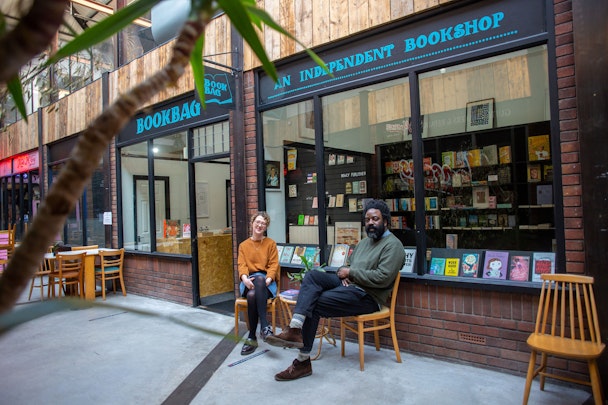A year in, how’s Bookshop.org’s plan to help indie UK booksellers pivot online going?
The Drum checks in with UK managing director Nicole Vanderbilt to hear about Bookshop.org’s first year, from helping small businesses survive lockdown to pooling resources for online events and supporting the launch of new physical shops.

Bookbag in Exeter is one of the independent shops trading on Bookshop.org/Image via Bookshop.org
Just over a year ago, Bookshop.org accelerated its UK launch to support independent bookshops around the country weather a winter of lockdowns. With little to no marketing spend, the platform has since generated over £1.6m for the 480 independent bookshops it has encouraged on to the site.
When it first launched in the US, Bookshop.org was hailed as a revolutionary moment in the history of online bookselling. Finally offering a more ethical alternative to Amazon, it allows book lovers to search and shop for books online in the manner they’ve become accustomed to, while also supporting independent bookshops up and down the country.
“When it comes to bookselling online, the standard has been set by Amazon, and it is fairly transactional,” says UK managing director Nicole Vanderbilt. “There’s no discovery or serendipity – the recommendations are driven by the sales algorithm and the personal touch of a bookseller is lost.”
For book lovers everywhere, the joy of shopping at indies in person is the hand-selected curation on behalf of talented booksellers. On Bookshop.org, independents can handpick lists of titles in much the same way as in-person, and shoppers are directed to their storefronts, with a percentage of the book’s cover price going back to an indie of their choice.
However, last winter the fate of indies across the UK was threatened due to erratic lockdown restrictions – which caused Bookshop.org to accelerate its UK launch in an effort to help them pivot quickly to online.
Surviving lockdown
While the platform overall has drawn some skepticism for not being as virtuous as it may claim (sellers on the platform only receive a 30-35% cut of the cover price of any book sold on the site, whereas this would rise to 40-50% if customers bought directly from the shop), Vanderbilt maintains that the accelerated launch allowed shops to adapt to e-commerce quickly and effectively in order to stay in business.
“When lockdown hit last winter many people were awakened to the idea that indies really weren’t going to survive the pandemic without e-commerce,” she says.
When UK-wide restrictions showed no signs of lifting, Vanderbilt says the platform’s next goal was to keep customers engaged through the curation of online events.
“In our mind we were always centered on the idea that we needed to help shops sell more books, so when selling tickets to online events, the ticket was a book purchase.”
Pooling resources
She says the events program demonstrated how small businesses can pool together on the platform, capitalizing on the draw of big-name speakers, such as author Kazuo Ishiguro, who might not typically attend small bookshop events in person.
“We have the ability to connect hundreds of bookshops together, and so we’re able to go to publishers with that and get them to support small local shops through one online event.”
Vanderbilt also explains that as the platform has grown in notoriety, it has been able to attract big name authors to curate shoppable lists on the platform, driving sales back into local shops.
“For example, we have one from author Elena Ferrante who is notoriously elusive, but this kind of content builds credibility for our platform while also allowing indies to share it across their own platforms and allowing them to take their cut of the profit.
“It creates a proximity to the industry that is both accessible and scalable to even the smallest bookshop.”
New futures
Vanderbilt says that as the UK comes out the other side of lockdown, it has seen a number of new bookshops appear on British high streets, with the presence of Bookshop.org allowing them to trade both in-person and online from the jump. She explains this development was also the inspiration behind the platform’s new program in collaboration with the Bookseller’s Association – New Futures, which helps entrepreneurs from underrepresented backgrounds launch their own bookshops.
“It takes the idea that if you can become an affiliate on Bookshop.org, it can help you secure the finances to open a physical shop, and we think this is especially true for people from communities underrepresented in the publishing and bookselling industry.”
The finalists of the program will be announced early next year, but Vanderbilt says she hopes it will set a precedent to see more representation of marginalized communities within physical bookshops.

In the run-up to Christmas (the most lucrative time of year for the book industry) Vanderbilt says we won’t be seeing any flashy campaigns from the platform, as it will instead continue to focus on “bringing incremental revenue to small businesses at a time when they are most busy.”
“We have some work ahead of us to improve the usability of the site, making it quicker, easier, and more searchable, but our main job now is to keep expanding and showing people that it’s easy and convenient to shop online in a way that supports independent bookshops.”
While the most effective way to support independent bookshops will always be to buy from them directly, those looking for the competitive prices and convenience of Amazon will find a comparable experience on Bookshop.org. A year into trading, we still await data on whether or not the alternative platform has taken away a percentage of Amazon’s customers, but it has proven itself as a lifeboat for the many UK indies put on pause by lockdown.

